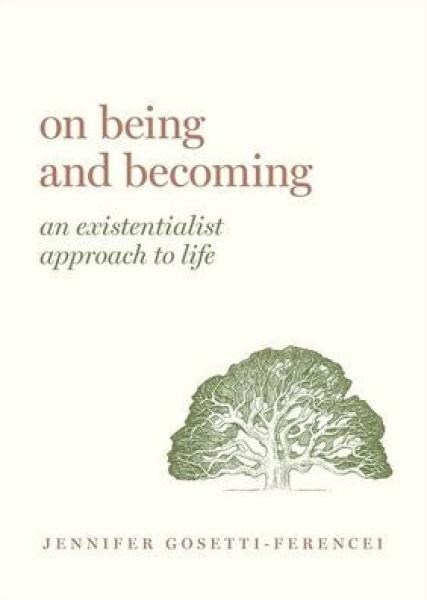Description
In this concise, accessible book, Gosetti-Ferencei offers a new vision of existentialism. As she lucidly demonstrates, existentialism is a rich and diverse philosophy that encourages meaningful engagement with the world around us, offering a host of fascinating concepts that pertain to life as we
experience it. The movement was as heterogeneous as it is now misunderstood, influenced by jazz music, involving diverse thinkers from around the world, challenging received ideas about the meaning of human existence. Part of the difficulty in defining existentialism is that it was never a unified
philosophy, but came to identify a set of shared concerns about the meaning and possibility of human freedom, as it may be expressed in authentic choices, actions, and projects. Existentialists all explored how, in the absence of traditional reassurances about the meaning of life, we may transcend
our present circumstances, and give our situation new meaning. With existentialism, concrete, lived experience of the single individual emerged from the shadow of abstract systems and long-defended traditions, and became subject-matter in its own right for philosophical inquiry. Far from
solipsistic, Gosetti-Ferencei shows that existentialist attention to the human self can be intertwined with ways of conceiving the world, our being with others, the earth, and the encompassing concept of being.
Fully appreciating what existentialism has to offer requires recognizing the rich diversity of its prospects, which involve not only anxiety, absurdity, awareness of death and the loss of religious meaning, but also hope, the striving for happiness, and a sense of the transcendent. On Being and
Becoming unpacks this philosophical movement's insights, and reveals how its core ideas promote creative responses to the question of life's meaning.
"The fact that you have picked up a book like this one and have begun to read it suggests that you strive for a fulfilling life. Presumably you aim, like many people do, to live as well and as meaningfully as possible, well aware that you have only one life, and that it is finite. Each day you press forward with no clear path signposted just for you. Your existence comes with no set of instructions what exactly to do with it. You will be well aware, perhaps with some anxiety, that only you can make some crucial decisions which will shape your existence, determine how your one life will play out. Existential philosophy begins by thinking from the standpoint of an individual concretely existing, wondering how to make sense of this existence. This may be anything but straightforward. In a busy, overcrowded world, there will be distractions everywhere from any goal you might try to keep in mind. At times you may not know which goals to strive for. Difficulties will arise. Some demands upon you will conflict with others, and responsibilities may come to feel relentless. Perhaps they do right now. You may come to wonder what this life is all about, and sometimes even despair at the lack of an answer. A sudden loss or change can render exigent otherwise merely nagging uncertainties. All of these concerns are the stuff of existential philosophy. If philosophy can be applied to spiritual ailments, existentialism is one of the most versatile prescriptions. Most people at some point in their lives will experience moments of suffering that have an existential cast. This is suffering that impacts your sense of self, making you wonder who you really are or ought to be, making you wonder about the purpose of your existence. The works of existentialist philosophers elaborate on such phenomena as despair, anxiety, dread, angst, forlornness, the tragic, the absurd, nothingness, being-towards-death, ennui, oppression, and inauthenticity. While not solving such human difficulties, existentialism recognizes and studies them in philosophical terms. Indeed, when a crisis is diagnosed as 'existential, ' it is salvaged from the indignity of mere pain, and recognized as bearing what the Danish philosopher S�ren Kierkegaard called a 'subjective truth.' The remedy of existential thinking comes in the form of relating individual struggles to a human condition understood as universal, and of illuminating the freedom and responsibility, or the creativity, with which they can be tackled"--
"In this deceptively easy to read book, Jennifer Gosetti-Ferencei packs three treatises in one: a smart introduction to continental philosophy, a brisk guide for living well and not dying stupid in an age of selfie-narcissism, and a new bridge between European and American culture linking Sartre
with Kerouac, Rilke with Frost, de Beauvoir with Wright, Camus with Ellison, Heidegger with Du Bois, all asking the key question 'Why am I here?' The answer? You'll find it yourself in these pages." -- Jean-Michel Rabat�, University of Pennsylvania, American Academy of Arts and Sciences
"On Being and Becoming is a timely book, as existentialism is an evocative response to the deep crises challenging our mortal and vulnerable existence. This book explores the existentialist answer to create our own meaning through our individual choices, not just in solitude but in engaged action
seeking to transform the social world. The broad existential movement is sympathetically and accurately portrayed by Gosetti-Ferencei. This book is richly packed with insights and fluidly written for a general audience. It is not just a work of academic philosophy--discussing, among others, Martin
Heidegger, Gabriel Marcel, Jean-Paul Sartre, Simone Beauvoir, Albert Camus, and Frantz Fanon--but it also documents the influence of existentialism on African-American thinkers, such as W.E.B. DuBois, Ralph Ellison, and Richard Wright." -- Dermot Moran, Boston College
"Digestible summaries and ideas for practical application make this guide accessible to any philosophically minded reader. Even those well versed in existentialist thought will walk away from this with a new appreciation for the philosophy." --Publishers Weekly
Product Details
- Oxford University Press, Brand
- Nov 9, 2020 Pub Date:
- 0190913657 ISBN-10:
- 9780190913656 ISBN-13:
- 336 Pages
- 7.1 in * 5.2 in * 1.2 in Dimensions:
- 1 lb Weight:




